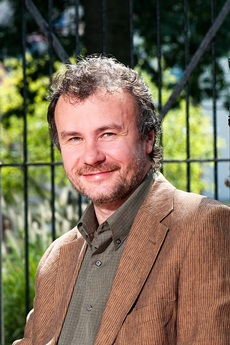Rutgers University–Camden Researcher Receives Funding to Develop Algorithm to Identify Genetic Mutations

CAMDEN — A Rutgers University–Camden professor has been awarded a grant that will fund the development of an algorithm that could better identify large-scale genomic changes, such as those related to evolution or disease-causing mutations.
The three-year, $604,475 award from the National Science Foundation allows Andrey Grigoriev, a professor of biology at Rutgers–Camden, along with a research team of students, to build on an algorithm that was developed in his lab and has so far proven to be successful. The algorithm could improve the way genomic data is analyzed for research and clinical practice.
“This grant will allow us to further develop our prototype and create an algorithm that can be accessible to other researchers and used as a standard tool in genomics,” Grigoriev says.
While the algorithm has broad applications for genome comparisons, cancer research is one area that can benefit significantly, Grigoriev says. Questions remain about how multiple somatic genetic mutations come together to cause cancer. Researchers are trying to identify the most accurate methods for detecting these mutations using whole-genome sequencing, which is a process that determines an organism’s complete DNA sequence.
By relating genetic variations in a patient’s tumor to normal tissue, “targetable genes” can be found and therefore, new drugs and treatments tailored to individual patients can be developed, Grigoriev says.
His team at Rutgers–Camden tested the prototype in an international competition known as the ICGC-TCGA DREAM Mutation Calling Challenge. The competition, conducted by several organizations including the International Cancer Genome Consortium and The Cancer Genome Atlas, issued a challenge to teams of researchers from around the world with developing an algorithm to better identify cancer-causing gene mutations.
Large centers, such as MD Anderson Cancer Center, and prominent genomic research organizations, like Broad Institute of MIT, Harvard University, and the multinational European Molecular Biology Laboratory, participated in the program.
The algorithm developed by Grigoriev’s students was one of the highest rated in the competition.
Now, the Rutgers–Camden team — which includes undergraduate and graduate students and a postdoctoral researcher — will get to build on the prototype algorithm. It is a multi-disciplinary initiative that will include students studying biology and computer science.
“The students will be able to see for themselves what it means to work on a project of such biological significance and see it through from the beginning to the end,” he says.
A seasoned researcher with experience in bioinformatics and computational and systems biology, Grigoriev, of Medford, is internationally recognized for research innovations that advance the applications of computational approaches to a wide range of life science disciplines, from metagenomics to aging to cancer research.